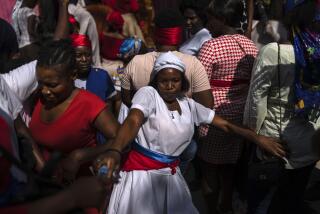Signal FM radio station provides lifeline in Haiti
- Share via
Reporting from Port-Au-Prince, Haiti — When her husband went missing in Haiti’s earthquake, Elcie Dyess turned to Signal FM radio station. Like thousands of other desperate people, she used the radio to broadcast an appeal for help.
Her husband, Jean Francois, was last seen at the bank where he works, she told the audience. Help me find him.
Scores of fellow bank employees responded by returning to the collapsed building. After hours of searching and digging, they pulled Jean Francois to safety.
As the days since the quake have stretched into weeks, Signal FM has served as the voice of, and lifeline to, a traumatized society.
“The people felt very alone,” said station owner Mario Viau. “We were here for them.”
With the government missing in action, and international relief efforts proceeding chaotically, Signal FM and a couple of other stations have eagerly opened the airwaves to the public, serving as a broadcast bulletin board for displaced, injured and homeless Haitians.
Many here cannot read, and no one has electricity for television (if they could afford a set in the first place), but radio is everywhere, on battery-operated transistors and ubiquitous car and bus receivers.
An hour or so after the Jan. 12 quake, Viau struggled through the destruction to reach the station’s studios, high on a hill in the affluent suburb of Petionville. The area suffered heavy damage, but the station stood unscathed.
Four employees also showed up, but they were afraid to enter the building. Signal FM had somehow continued to broadcast music even through the roaring jolts of the quake, Viau said.
Eventually, Viau persuaded his staff to return to the mikes.
They quickly began recounting the horrors they had just witnessed. Over time, almost the entire roster reported for work, and Signal FM has been on the air nonstop.
None of the radio’s 23 employees was killed, Viau said, but many lost relatives and homes.
Crowds assemble outside the station every day. Representatives from the emergency neighborhood “committees” that have popped up all over Port-au-Prince are given air time to list their needs: At Delmas 63, we need water and food. On Nazon Street, there are many bodies in need of removal.
Signal FM broadcasters report which hospitals are open, or where food will next be distributed in Petionville. In the early days, they also reported the many claims that voices were being heard, or text messages received, from beneath the rubble at St. Gerard vocational school and other sites of massive loss of life.
Viau and his team have also helped to reunite families. The station airs messages from Haitians in the United States searching for relatives as well as the responses -- when they come.
Broadcasters have interviewed aid workers, engineers and diplomats. They’ve delivered advice to new mothers to nurse rather than give babies formula made with dirty water.
Periodically they pause just to read very long lists of the dead.
Viau has been sharply critical of President Rene Preval for failing to quickly address and reassure his people. Preval, whose private residence crumbled, along with the presidential palace, was virtually invisible in the early days, then only sporadically issued statements or spoke in public.
“He should have been on the air one hour after the quake to say, ‘I’m alive, we will do everything possible to help,’ ” Viau said in an interview at the station, speaking over the whir of huge generators.
“I understand this was a young government not structured for this sort of thing, and all the government buildings fell down, and they had to regroup,” he said. “I don’t want to blame . . . but eventually, you have to blame.”
He said he invited a government spokesman to speak from the very first minutes but it took three days for anyone to appear.
Viau, a gregarious man, is also a politician and candidate in legislative races that, until the quake, had been scheduled for Feb. 28. They have been indefinitely postponed. On some walls still standing, one can see graffiti in both support and opposition of his candidacy.
“Service to the people has not been a priority” in Haitian government, he said.
And so Signal FM, and several others, are filling the void.
Elcie Dyess swears by it. She was visiting Signal FM the other day, with her rescued husband, to give thanks. Jean Francois, 55, had taken refuge under his desk at the bank when the quake hit. He wasn’t hurt, but he had no way out. He thought of God and his family, he said, and by the third day was sustaining himself by drinking his urine.
On the fourth day, after Elcie spoke out on the radio, he heard his co-workers shouting for him. Then he saw a bit of sunlight. He began shouting back. For seven more hours they dug with their hands and pieces of metal, then finally they freed him.
“It was a miracle, but it was also solidarity,” Jean Francois said. “You need solidarity, the work of everyone: the radio, the bank staff and, of course, my wife.”
More to Read
Sign up for Essential California
The most important California stories and recommendations in your inbox every morning.
You may occasionally receive promotional content from the Los Angeles Times.














